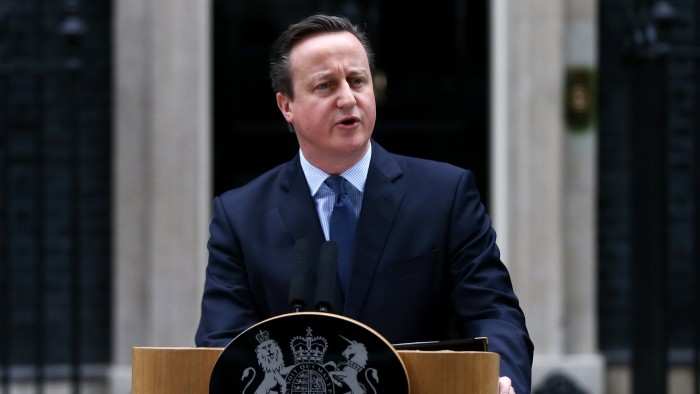David Cameron finally makes the case against Brexit

Roula Khalaf, Editor of the FT, selects her favourite stories in this weekly newsletter.
When the British people vote in this summer’s referendum on whether or not to leave the EU, their choice will define the UK’s future for a generation.
The world will little note nor long remember the details of the renegotiation package David Cameron has brought home from Brussels. It purports to offer Britain a new special status in Europe; but ultimately, as the prime minister has recognised, the decision on EU membership goes to the “heart of what country we want to be”.
For the outcome of the June 23 referendum may well determine the fate of two unions. If the English vote to withdraw from the EU, the Scots are virtually guaranteed to call for a fresh referendum on independence. Nicola Sturgeon, first minister, made that clear on Sunday. Meanwhile, the aftershocks from Brexit — the departure from the bloc of one of its largest member states — would severely destabilise the EU at a time when it is facing an existential struggle over the migrant crisis.
For the moment, these vital geopolitical considerations are overshadowed by divisions in the ruling Conservative party. Michael Gove, justice secretary, has joined the Brexiteers. His defection gives intellectual heft to an Out campaign that still lacks convincing leaders. Boris Johnson, mayor of London, will also lend swagger, though his very public vacillations on Europe have hardly lived up to the character of his biographical hero Winston Churchill.
More encouraging has been the sight of Mr Cameron finally making a full-throated case for Britain to remain. For most of his term in office, Mr Cameron has struggled to manage his party over Europe. After his marathon negotiation in Brussels, and a good night’s sleep, the prime minister has staked out the high ground.
He spoke convincingly on television about the benefits of membership, not just in terms of investment and jobs but also national security. Pointing to the threat of Vladimir Putin’s Russia to the east and the Isis radical jihadis to the south, the prime minister rightly invoked the principle of “safety in numbers in a dangerous world”.
He also took aim at the central weakness on the Leave side. Its advocates cannot define, or even decide, what the world according to Out actually looks like. Brexit would be a “step into the dark”, with no certainty over the trading arrangements the UK would ultimately enjoy. Similarly, he rebutted the notion that Britain would enjoy more control over its destiny outside the EU. Leaving the EU would offer no more than the “illusion of sovereignty”.
On this particularly vexed issue, Mr Cameron’s renegotiation in Brussels has brought a measure of relief. Britain is exempted from “ever closer union”, a statement of limited legal value but of symbolic importance. The UK can, on its own, cry foul at future EU summits if it believes the City of London is being discriminated against by the eurozone.
Of most political significance, Mr Cameron has defended Britain’s right to restrict in-work benefits for EU migrants for four years. This falls short of a commitment made in the Conservative manifesto and is unlikely to affect migrant flows into the UK, something the prime minister has pledged to tackle. Still, it is a concession that many thought the EU would never give him.
Even so, Mr Cameron has failed to meet his ill-judged pledge to secure “fundamental far-reaching” change in the terms of Britain’s membership. His room for manoeuvre was inevitably limited because the UK already has opt-outs from the euro, the Schengen passport-free zone and aspects of justice and home affairs. Other countries were always going to resist Britain opting for more à la carte Europe.
Mr Cameron has compounded his difficulties by failing to cultivate allies in Europe, too often playing to the Eurosceptic gallery at home. With populist sentiment across the continent running high, many leaders were reluctant to do the British special favours, even the central Europeans who have benefited from Britain’s historic support for enlargement.
Not for the first time in his career, Mr Cameron has recovered from a slow start. He can expect further support this week when half of the FTSE 100 companies, including major multinationals such as BT, Shell and Vodafone, will argue strongly that British jobs and investment depend on membership of the EU. The case for a confident, open, engaged, pro-European Great Britain is waiting to be made. It cannot be allowed to go by default.
Letter in response to this editorial:
Now Brexit’s been put into perspective let’s move on / From Tim Ward
Comments